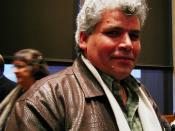RACIAL PROFILING
The Dilemma of Racial Profiling in America
Xxxxx Xxxxxx
Running head: RACIAL PROFILING
XYZ University
The Dilemma of Racial Profiling in America
Racial profiling has a long history in the United States, dating back to the early 1700's when white men policed black slaves, stopping them to check for passes to make sure they had permission to be off the plantation. In rare instances, blacks would provide "freedom papers" to show they were free men, however, the color of their skin was the contributing factor for the stop (Rushing, 2013). Alternatively, profiling is used by law enforcement to target various factions of the criminal element; however, profiling using race, ethnicity, or nationality is not only illegal, it has caused comparisons to the post-reconstruction Jim Crow laws. Racial profiling in law enforcement serves a legitimate purpose in specific instances; however, the controversy and misunderstanding surrounding its application prevents it from being effective.[1:
http://www.huffingtonpost.com/keith-rushing/dissecting-racial-profiling_b_2740246.html]
Racial profiling as it pertains to this topic of discussion is defined as a practice that targets people for suspicion of crime based upon their race, ethnicity, religion or national origin. Although racial profiling has been around since the early 1700's, it appears that the negative connotations associated with the rampant racism that plagued this country for decades has followed legitimate law enforcement protocols into the 21st century. Unfortunately, this has hampered law enforcement's efforts at curtailing the criminal element based upon a number of factors, to include frivolous litigation. Many of the allegations of racial profiling against law enforcement are invalid based upon a landmark ruling by the United States Supreme Court in 1968 that came to be known as "Terry stops."[2: http://www.nij.gov/topics/law-enforcement/legitimacy/pages/racial-profiling.aspx]
In 1968, the United States Supreme Court ruled in Terry V. Ohio that the 4th amendment prohibiting unreasonable searches and seizures did...


